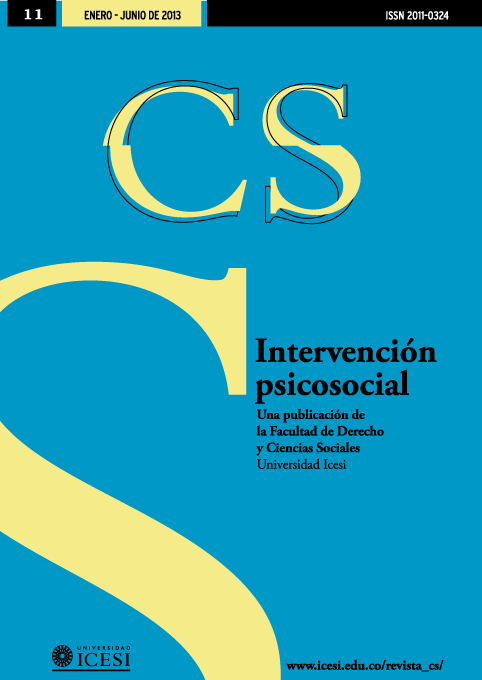Psychoanalysis and Social Intervention
DOI:
https://doi.org/10.18046/recs.i11.1568Keywords:
psychoanalysis, social intervention, clinic, subjective responsibility, victims of armed conflictAbstract
This paper presents some reflections on the contributions of the psychoanalytic approach to the field of social interventions with the aim of locating those points in which psychoanalysis presents itself as a relevant discipline for taking action in response to contemporary social issues. These reflections are the result of a number of experiences coordinating psychosocial intervention groups and are linked to programs dedicated to holistic care and the re-establishing of rights to populations affected by the armed conflict in Colombia.Downloads
References
Freud, S. (1921). Psicología de las masas y análisis del yo. Obras completas, Tomo XVIII. Buenos Aires, Argentina: Amorrortu.
Freud, S. (1923). El yo y el ello. Obras completas, Tomo XIX. Buenos Aires, Argentina: Amorrortu.
Gallo, H. (2008a). Maltrato infantil. Teoría y clínica psicoanalítica. Medellín, Colombia: Universidad de Antioquia.
Gallo, H. (2008b). Subjetividad y conflicto armado. En Conflicto armado: memoria trauma y subjetividad (pp. 37–40) Medellín, Colombia: La Carreta Editores.
Gallo, H. (2012). Estudio de caso, entrevista investigativa y clínica del caso en psicoanálisis. En J. Orejuela, M. Moreno y M. Salcedo. Abordajes psicoanalíticos a inquietudes sobre la subjetividad. Cali, Colombia: Editorial Bonaventuriana.
Greiser, I. (2012). Psicoanálisis sin diván. Los fundamentos de la práctica psicoanalítica en los dispositivos jurídico asistenciales. Buenos Aires, Argentina: Paidós.
González Rey, F. (2003). Sujeto y subjetividad. Una aproximación histórico cultural. México D. F., México: Thomson.
Lacan, J. (1954). El seminario. Libro 2. El Yo en la teoría freudiana y la técnica psicoanalítica. Buenos Aires, Argentina: Paidós.
Lacan, J. (1959). El seminario. Libro 7. La ética del psicoanálisis. Buenos Aires, Argentina: Paidós.
Lacan J. (1955). Variantes de la cura tipo. Escritos 1. México D.F., México: Siglo XXI.
Miller, J. A. (2008). El partenaire–síntoma. Buenos Aires, Argentina: Paidós.
Montero, M. (2006). Hacer para transformar: el método de la psicología comunitaria. Buenos Aires, Argentina: Paidós.
Moreno, M. y Perdomo, A. (2012). El psicoanálisis es una disciplina inseparable de la vida. Entrevista a Héctor Gallo. Cali 2009. En J. Orejuela. Palabra Plena. Conversaciones con psicoanalistas. Cali, Colombia: Editorial Bonaventuriana.
Ramírez, M. E. (2007). Ordenes de hierro. Medellín, Colombia: La Carreta Editores.
Rodríguez, A. (2009). El enfoque de la acción sin daño. Bogotá, Colombia: Universidad Nacional – Programa de iniciativas universitarias para la paz y la convivencia.
Valencia, A. (2012). Abrir el psicoanálisis y las ciencias sociales. Reflexiones en torno al libro Palabra Plena. En J. Orejuela, Palabra Plena. Conversaciones con psicoanalistas (pp. 11–26). Cali, Colombia: Editorial Bonaventuriana.
Zawady, M. (2005). La responsabilidad subjetiva. Actualidad del planteamiento freudiano. Desde el jardín de Freud: revista de psicoanálisis, (5), 128–143.
Downloads
Published
Issue
Section
License
Copyright (c) 2013 Manuel Alejandro Moreno

This work is licensed under a Creative Commons Attribution-NonCommercial 4.0 International License.
© Reserved Copyright
Material in this publication may be reproduced without authorization, provided the title, author and institutional source is acknowledged.
The content published in Revista CS is distributed under the Creative Commons BY-NC 4.0 Attribution/Recognition-NonCommercial 4.0 International license.
You are free to:
Share — copy and redistribute the material in any medium or format.
Adapt — remix, transform, and build upon the material.
Under the following terms:
Attribution — You must give appropriate credit , provide a link to the license, and indicate if changes were made . You may do so in any reasonable manner, but not in any way that suggests the licensor endorses you or your use.
NonCommercial — You may not use the material for commercial purposes.












